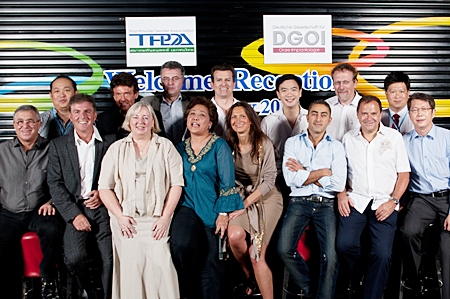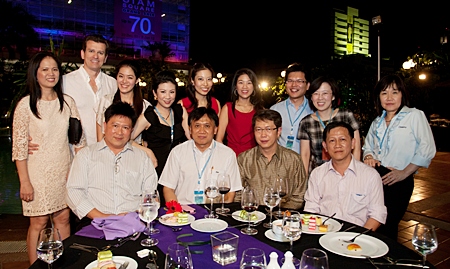With Thailand an increasingly popular destination for medical tourism, the country proved the obvious choice to host the first German-Thai Implantology Congress.
The Jan. 7-9 confab in Bangkok was attended by German Ramin Yachkaschi, the only non-Thai to pass the country’s Dental Board Exam, along with members of the German Society of Oral Implantology and the Thai Private Dentist Association.
 (From right) Dr. Thaweesak, president of TPDA and Dr. Bayer, president of DGOI. (Back row in the middle) Dr. Ramin Yachkaschi from Pattaya, with other participants.
(From right) Dr. Thaweesak, president of TPDA and Dr. Bayer, president of DGOI. (Back row in the middle) Dr. Ramin Yachkaschi from Pattaya, with other participants.
Experts in dental implants came from around the globe to share knowledge with Thai specialists. More than 300 dentists, mostly from Thailand, updated their education in the many lectures.
Implants are artificial dental roots made from titanium or ceramic, which are inserted into the jaw to replace lost teeth. Normally, after a healing period of 3-6 months, a “supraconstruction” will be put on the implants, which can be crowns, bridges or even whole dentures.
 Dr. Thaweesak (2nd right), Dr. Ramin Yachkaschi (2nd left) with his wife (far left) and a few Thai dentists.
Dr. Thaweesak (2nd right), Dr. Ramin Yachkaschi (2nd left) with his wife (far left) and a few Thai dentists.
One new trend highlighted was digital Implantology. After a CT scan of the jaw, a surgical guide is produced with 3-D modeling technology. The surgical guide will show the implantologist the exact position and angle of the implant, so the surgical procedure will be much safer with fewer complications.
Another trend is the so-called “immediate load.” In many cases, special surgical and reconstruction techniques can be used so that a provisory prosthetic can be put on the implants immediately in order to shorten or even avoid the healing period.




